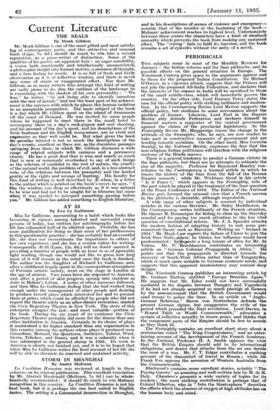Current Literature
THE SEALS
By Monk Gibbon
Mr.-Monk Gibbon is one of the most gifted and most satisfy- ing of contemporary poets, and this attractive and unusual book (Cape, 7s. 6d.) should do much to 'win him a second reputation, as a prose-writer of distinction. Some of the qualities of his poetry are apparent here : an eager sensibility, a vision both emotionally and intellectually unconstricted, a philosophic insight into human motive; a.snreness of thought, and a firm feeling for words. -it is as full of fresh and lively observation as it is of reflective wisdom, and there is never any sense of strain or exaggerated effort. - Nor does Mr. Gibbon, as so many writers who attempt this kind of writing are sadly prone to do, dim the outlines of the landscape he is examining with the shadow of his own personality : We lose," he writes, by not being able to identify ourselves with the -rest of nature," and not the least-part ofhis-achieve- ment is the sureness with which he places this human isolation in an acceptable perspective. The basic subject of the book is a day which Mr. Gibbon spent on the island of Arranmore Off the coast of Donegal. He was invited by some people whom he happened to meet there in the small hotel to accompany them on a day's rock-pigeon and seal shooting, and his account of the day's sport, and his descriptions of the Irish boatmen and his English companions, are as vivid and espy rssive as they well could be. But what gives the book Its peculiar interest is not so much the descriptions of the day's events, excellent as these are, as the discursive passages springing from them, in which Mr. Gibbon discusses a wide range of related subjects with sureness and a persuasive charm. He has a great deal that is wise and nearly as much that is new or commonly overlooked to say of such things as the relation of mankind to the rest of nature, the cruelty of the natural world, the problem of evil, and, in a less abstract vein, of the relations between the peasantry and the landed gentry or the rights and wrongs of hunting. His faculty for this kind of writing is well described by lE when, in a letter to the author which is printed on the book'S cover, he says, " I like the wisdom you drop so effortlessly as if it was natural to be wise and had not to be sought for in libraries but came when it was needed to interpret something passing before yea." Mr. Gibbon has.added something to English literature.






































 Previous page
Previous page